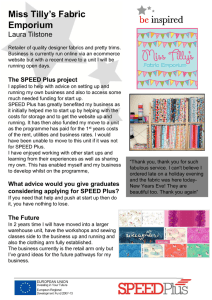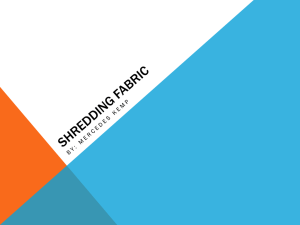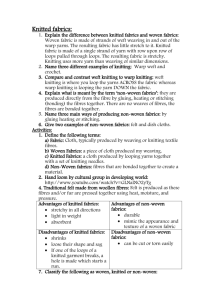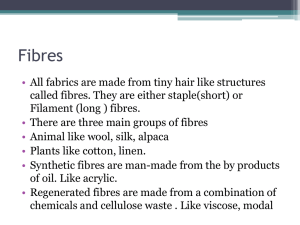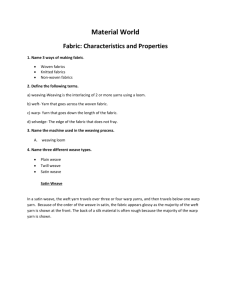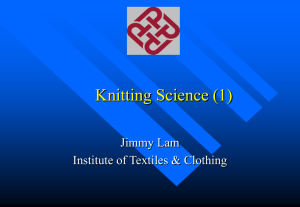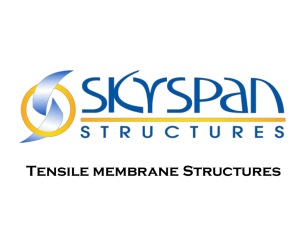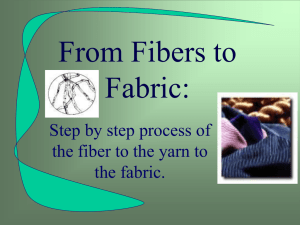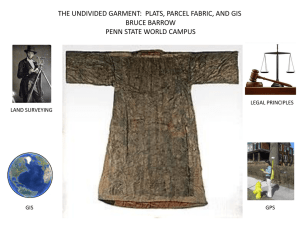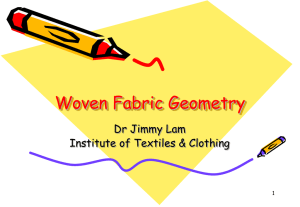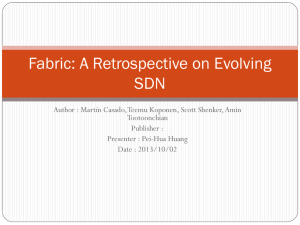Fabric Investigation - Villiers High School
advertisement
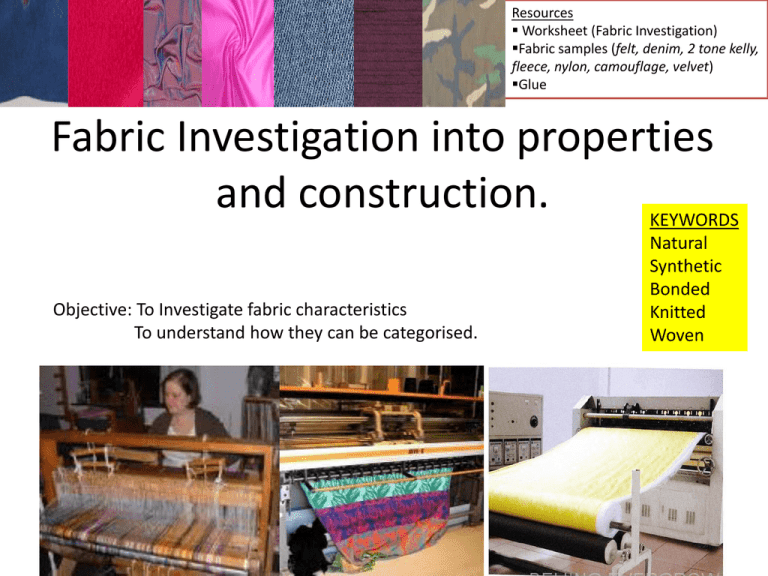
Resources Worksheet (Fabric Investigation) Fabric samples (felt, denim, 2 tone kelly, fleece, nylon, camouflage, velvet) Glue Fabric Investigation into properties and construction. KEYWORDS Objective: To Investigate fabric characteristics To understand how they can be categorised. Natural Synthetic Bonded Knitted Woven Starter: Natural or Synthetic? Fabric is manufactured by weaving or knitting, bonding or felting fibres together. The fabric fibres come from either a natural or synthetic source • • Natural come from plant and animals. e.g Wool, Cotton, Leather. Synthetic are manufactured e.g Viscose, Polyester. Look at your fabric samples –You have 60 seconds to sort into EITHER of natural or synthetic. End Click to start timer Can you name them correctly? Felt, Denim, 2 Tone Kelly, Fleece, Nylon, Camouflage, Velvet Natural: Denim, Camouflage Synthetic: Felt, 2 Tone Kelly, Fleece, Nylon, Velvet . Did you get them right? NEXT: Manufacture of natural and synthetic fibres Manufacture of fibres and fabrics • Woven fabrics are made by weaving or knitting yarns. • Non-woven are made by bonding or felting fibres together. Are the items below bonded, felted, knitted or weaved – you have 30 seconds to decide!? TIP: Identify the fabric Click to start timer Manufacture of fibres and fabrics • Woven fabrics are made by weaving or knitting yarns. • Non-woven are made by bonding or felting fibres together. Are the items below bonded, felted, knitted or weaved – you have 30 seconds to decide!? TIP: Identify the fabric felted Weaved woven bonded knitted knitted Tasks PART A: Fabric investigation Look at your selection of fibres – Try pulling them, stretching them etc. Can you figure out which are bonded, knitted or woven? Work in teams. Timed activity: 10 minutes Clock Glue the fibres into onto the correct box on your worksheet. PART B – This can be done as a team. 1. Frays. 2. Doesn’t fray 3. Stretches. 4. Doesn’t stretch 5. Fluffy 6. Shiny 7. Rough 8. Smooth 9. Tears in a straight line 10. Tears uneven 11. Easy to work with (sew) Timed activity: 15 minutes Write at least 3 of the above descriptions for each Which fabric am I? • Look at the magnification of fabric – can you tell which is which? TEST YOURSELF!!! Go to: www.bbc.co.uk/schools/gcsebitesize/design/textiles •Then select the Fabrics test - See how well you do – this will be the best indicator of your subject knowledge! Which fabric am I? • Look at the magnification of fabric – can you tell which is which? TEST YOURSELF!!! Go to: www.bbc.co.uk/schools/gcsebitesize/design/textiles •Then select the Fabrics test - See how well you do – this will be the best indicator of your subject knowledge! G&T Plenary: Fabric information Plain weave Selvedge Warp Weft Strong and hardwearing. Examples would include calico and drill cotton, linen, poly-cotton etc. Twill weave Diagonal pattern on the surface. Strong. Used for jeans, curtains and jackets Warp knitted fabrics Made by machines-They interlock vertically along the length of the fabric. They are slightly stretchy and DO NOT LADDER! Examples would include swimwear, geotextiles and underwear. Weft knitted fabrics Made by looping long lengths of yarn together. Stretchy and comfortable. (If a stitch is dropped it will cause a ladder down the length of the fabric because the yarns run across the fabric in rows).Examples would include socks, tights, T-shirts and Jumpers. Can you identify the weave or knit in your fabric samples? Can you explain your reason? Extension Go to: You will need to log onto the following webpage to test yourselves on your fabric knowledge! www.bbc.co.uk/schools/gcsebitesize/design/textiles •Then select the Fabrics test - See how well you do – this will be the best indicator of your subject knowledge! Answer Felt - neither weaved or knitted!, Denim – twill weave 2 Tone Kelly – plain and twill, Fleece – weft knitted Nylon - plain and twill Camouflage – twill weave, Velvet – twill weave
